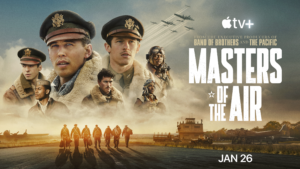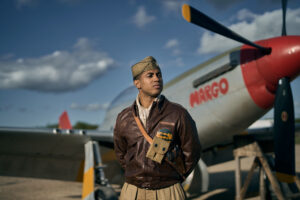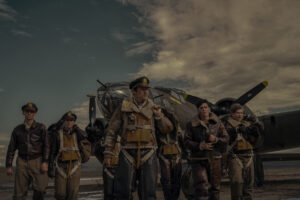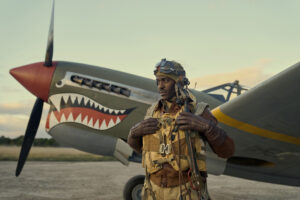
UrbanFaith Editor Allen Reynolds had the opportunity to talk to Dee Rees, one of the directors of the hit Apple TV+ series Masters of the Air which featured the Tuskeegee Airmen and fighter pilots during World War II. He talked with Dee about what it was like to tell share this piece of history with the world.
Allen
Thank you so much for sharing with us the Urban Faith. And I would have to say that it was really moving and a pleasure to watch these episodes of Masters of the Air, especially episode 8 you got to take part in directing. My first question, Dee, is looking at that second to last episode, why was it important in the midst of a series that focused a lot around the Fighting 100th squadron to tell the story of the Tuskegee Airmen for you? Why was that an important choice?
Dee Rees
Sure. It was important to tell the story of the Ninety-Nine Fighting Squadron, because they are what enabled the 100th to be successful. So, it was important to kind of get that part of the story in front of audiences and know that these men were also masters of the air.
 Allen
Allen
Absolutely, they were. Can you talk a little bit about why you chose to not just show them as heroes, but also show them as folks who were trying to overcome a lot in the process?
Dee
Right, so in episode seven, we’re a lot, the story is set in Stahlglof 3, and so our guys are literally grounded, you know? And so without the gear, without the planes, without the machines, they’re really forced to confront themselves and confront the things in them that are gonna have to change to not just escape, but to make their lives post-war better. And so, it was good to really get into the friendships and just kind of get into the [humanity] and the struggles. They’re gonna have to like vow to be like better people. I think when they’re [not] flying it forced the characters to literally sit. Sit out of the action and to relent. And in that [waiting], being able to relent to circumstance, becoming like better men and stronger men and really thinking about having to change their lives. And the same for the Tuskegee airmen in that camp. I wanted to show that that was the first time that a lot of their white colleagues had been in proximity with black people and a forced to kind of confront those own demons within themselves and decide who they’re gonna be.

Allen
Can you talk about why it’s important that we got to see them make that bridge and kind of what that speaks to in the midst of that larger World War II context and for us learning that history.
Dee
Yeah, so for Megan and Jefferson [The Tuskegee airmen], they’re acutely aware that they’re not just fighting this battle abroad, they know that they’re gonna have to go home to another battle, you know? In this fight, they have allies and that’s the way they’re able to survive. And it’s kind of getting through the idea that they’re gonna need those same allies to fight their battle at home. And in this small way, we start to suggest that maybe they’ll start to kind of find those [allies] in these men who’ve served together. It kind of highlights the bravery and courage of these airmen who are fighting for a country who’s not necessarily gonna fight for them. It heightens their struggle and then contextualizes it versus the other the members of the 100th who are, you know, caught up in their own worlds. It kind of broadened their kind of outlook to say, “wow, look at these guys who have this bigger struggle.”
 Allen
Allen
Absolutely. So last question for you, Dee. What are some takeaways or some lessons you would want young folks to hear from [Masters of the Air]?
Dee
I would kind of go to some of the mottos of the fighting squad themselves: “aim high and expect to win,” you know? Even though, you can’t change the weather, like one of my favorite lines, like “you can’t change the weather, but that just teaches you how to fly better and be better pilots.” And in that way, the Tuskegee airmen had to become better pilots because they were up against winds that they couldn’t change.
